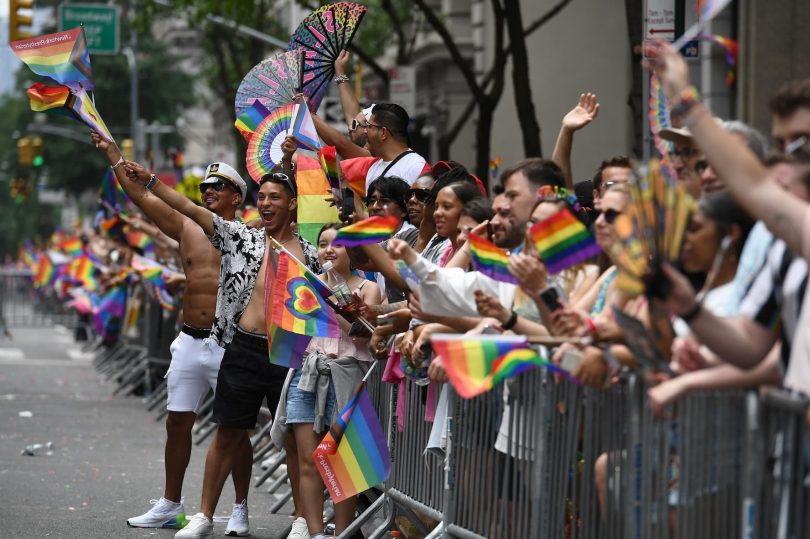Over 500 anti-LGBTQ+ bills have been introduced since 2023 alone in the U.S., ranging from limiting drag shows to outlawing gender-affirming health care. These bills have almost all been introduced by Republican lawmakers throughout state legislatures with 77 bills becoming law last year. Even bills that do not become law have a negative impact on the well-being of the LGBTQ+ community. The Trevor Project reports that 90% of LGBTQ+ young people said their well-being was negatively impacted by recent politics and the constant exposure to discriminatory bills. An astonishing 39% of LGBTQ+ young people have seriously considered attempting suicide this past year alone, with people of color reporting higher rates than their white counterparts.
This subgroup of the electorate has been targeted by hateful rhetoric that has impacted the community physically and emotionally. For instance, a March 2024 GLAAD poll found that 49% of LGBTQ+ voters stated they experienced bullying and harassment and 72% said their mental health declined directly due to the negative political discourse in this country.
The weaponization of policies targeting this vulnerable community has also resulted in an increase of violence which disproportionately impacts people of color, highlighting the intersection of racism, sexism, homophobia, and transphobia implicit in the bills targeting the LGBTQ+ community.
Anti-LGBTQ+ laws also have the potential to stir animosity and fear among voters who support conservative candidates and help them gain an edge in the upcoming 2024 elections. It remains to be seen if this strategy will be successful or if it will energize the people to vote repressive leadership out. This post intends to shed some light on this question and explore the long-term electoral consequences of these discriminatory policies.
Republicans have a negative perspective on LGBTQ+ Americans
There is unfortunately an audience for anti-LGBTQ+ laws, which motivates conservative candidates to appeal to them to energize their base. LGBTQ+ rights are highly partisan, as 77% of Republicans believe that LGBTQ+ people have a somewhat or very negative influence on society. Furthermore, Republican support for the LGBTQ+ community has dropped from 66% to 59% from 2022 to 2023. The 2024 Republican platform explicitly states they will oppose “left-wing gender insanity” and has no endorsement for equal rights. This is nothing new for the GOP. In fact, in 2004, the party campaigned for a constitutional same-sex marriage ban. Twenty years later, it appears that now the focus has shifted from attempting to pass federal policy to passing legislation in state legislatures and focusing on state level restrictions to access care and resources for the LGBTQ+ community. There has also been a strategic shift in conservative circles to focus policy action on transgender and non-binary people, as there is less support among Americans for this segment of the population (67%) compared to gay and lesbian people (80%).
By centering LGBTQ+ issues around gender identity controversies, the Republican Party has capitalized on Americans’ uncertainty about gender expression and the potential impact on their children. The focus on children is effective given the distinction Americans make between children and adults regarding policies associated with gender and sexuality. For example, Americans are much less supportive of children receiving gender-affirming care relative to adults, and regulations on controversial medical practices for minors like puberty blockers or surgery are highly contentious.
While its evident there is a strong and loud base that supports anti-LGBTQ+ measures, the extreme nature of these laws that discriminate against a specific sub-group of the American population may motivate the LGBTQ+ electorate, as well as their allies, all of whom are directly impacted by these policies, to turn out for the 2024 election.
The electoral map is evolving due to the increase of the LGBTQ+ population
LGBTQ+ voters are an emerging voting bloc that will be key in future elections given underlying demographics. With 7.6% of the American population identifying as LGBTQ+, this electoral sub-group could have a marked impact on the presidential race, which is projected to be decided by a small number of votes in a handful of battleground states. The Human Rights Campaign reports that there is a growing number of youth voters who identify as LGBTQ+, including 27% of Gen Z and 15.6% of millennials. In most cases, LGBTQ+ Americans are highly engaged in politics and vote in record numbers, with a 2020 exit poll showing LGBTQ+ adults accounted for seven percent of all voters despite only representing 4.5% of adults. In the 2022 midterm elections, over one in 10 (11.3%) of eligible voters were LGBTQ+, with this voting bloc expected to surge nearing one in five (17.8%) by 2040. As their numbers grow, so does their influence in the electorate.
This increase in the LGBTQ+ population is projected to transform the electoral map, tipping the scales from “red” to “purple” in several consequential swing states like Georgia, Texas, and Ohio. This transpired in the 2022 election when 53% of non-LGBTQ+ voters in Georgia voted for Trump, but 88% of LGBTQ+ voters voted for Biden, helping to flip the state blue. By 2030, key states will see an increase in LGBTQ+ voters with Arizona (15.7%), Texas (16%), and Nevada (17.1%) expected to have a higher proportion than the national average (14.3%). Ohio is projected to have the highest increase (86%) of LGBTQ+ voters from 9.5% in 2020 to 17.7% in 2040.
LGBTQ+ voters overwhelmingly support Democrats
Given the policy agenda of the GOP, it is not surprising that young voters who identify as LGBTQ+ are overwhelmingly Democratic in their party identification; 93% identify as Democrat compared to just five percent who identify as Republican. For decades, lesbian and gay activists were building rapport with leaders in the Democratic Party to synthesize a new collective identity that encompasses the interests, experiences, and goals of the of broader LGBTQ+ community. It’s theorized that because of this constitutive group mobilization on the part of leadership in both groups, the Democratic Party was able to expand its boundaries to let what was originally seen as a fringe minority into the base of a new solidified political identity. The need to use voting to fight back against the discriminatory legislation pushed these past few years has made the community more enthusiastic about the 2024 election and highly motivated to get to the polls. In fact, a recent September poll found that 95% of LGBTQ+ adults are registered to vote, with 93% of those surveyed saying they are motivated to vote in November 2024 with a clear preference for the Democrats. The poll shows that 67% of LGBTQ+ voters plan to vote for Kamala Harris over Donald Trump in part due to their top priorities (52%) being advancing LGBTQ+ equality and combating anti-LGBTQ+ laws.
It’s in the interest of the GOP to move away from these extreme policies and to reject candidates who support this type of legislation. Americans’ opinions on the LGBTQ+ community are largely supportive and accepting. According to respondents from a February 2023 GLAAD poll, 91% of non-LGBTQ+ Americans agree that LGBTQ+ people should have the freedom to live their life and not be discriminated against.
Among young Americans (aged 18 to 29), there has historically been more support for the LGBTQ+ community compared to other sub-groups. The last three elections have shown the increasing involvement of young people in politics and that they are very interested in social issues. An exit poll from the 2022 elections showed a youth voter turnout of 27%, the second highest in over three decades, with 63% voting for Democrats. This generation has some of the highest acceptance rates of the LGBTQ+ community, and they are willing to go to the polls to fight for people’s rights. The long-term electoral consequences of these anti-LGBTQ+ policy efforts are potentially much more interesting than what might transpire in 2024.
LGBTQ+ legislative representation is crucial to bringing about change
The presence of LGBTQ+ elected officials can reduce the likelihood that discriminatory bills are introduced and passed. The LGBTQ Victory Fund, a national organization dedicated to electing LGBTQ+ leaders to public office, reports that there are now over 1,100 LGBTQ+ officials holding public office in the U.S. Since 2017, when the report was first commissioned, this number has grown from 448 LGBTQ+ elected officials to 1,303 in 2024, and of the LGBTQ+ candidates that ran for office, 70.8% of them are Democrats.
While this only represents 0.25% of U.S. elected officials, the projected growth in representation will eventually have an impact on policy outcomes. U.S. Sen. Tammy Baldwin, (D-Wis.), one of three openly LGBTQ+ people in the Senate, reached out to Republicans to garner support for the Respect for Marriage Act, which 12 Republican Senators voted for. The impact of having this representation is also felt at the local level, such as when the first openly gay mayor of San Diego appointed an LGBTQ+ Advisory Board and established LGBTQ+ liaisons with the police department.
There are political consequences for discriminatory platforms
Discriminatory policies could have a significant impact on election outcomes across the country in November. Twenty candidates in the 2022 election cycle ran on largely discriminatory platforms, and many lost their races, including Tudor Dixon in Michigan, Blake Masters in Arizona, and Doug Mastriano in Pennsylvania.
Anti-LGBTQ+ politics are mobilizing more LGBTQ+ voters than those who oppose LGBTQ+ rights. Trends from the past elections show that LGBTQ+ people vote overwhelmingly for the Democratic Party and will keep doing so as long as the Republican Party continues to push extreme laws that are harmful to the LGBTQ+ community.







